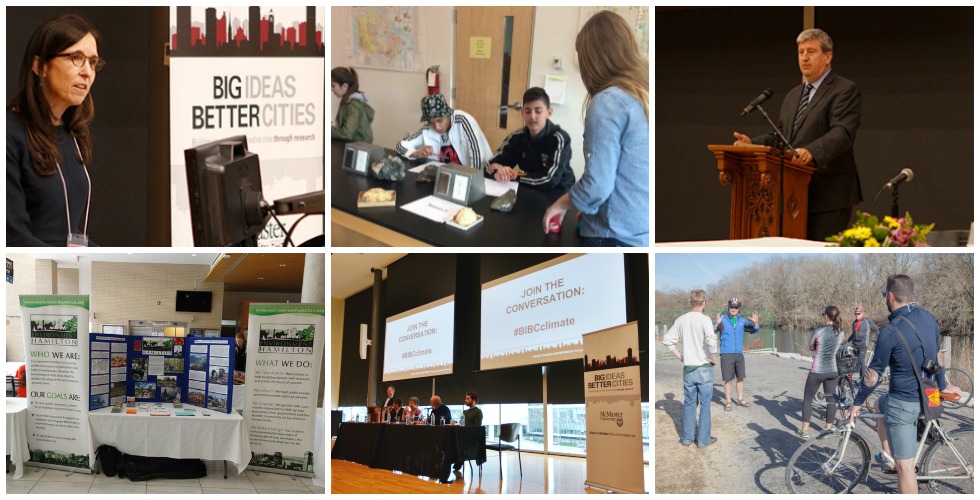Big Ideas, Better Cities concludes with a conversation on Hamilton Harbour

‘Big Ideas, Better Harbour’ concluded ‘Climate Change and Environment: Navigating from Risk to Resilience’ (April 18-22) the final set of events in the ‘Big Ideas, Better Cities’ series. Throughout the week, 900 members of the McMaster and Hamilton communities attended a range of events including talks, panel discussions and tours which took place both on McMaster’s campus and in the Hamilton community.
Big Ideas, Better Cities events wrapped up on Friday night with a conversation on Hamilton Harbour– past, present and future.
Big Ideas, Better Harbour, held at McMaster’s David Braley Health Sciences Centre in downtown Hamilton, brought together academics, civic leaders, community activists and residents to explore ways to support a healthy and thriving harbour.
The event featured speakers and a panel discussion, including a talk on the history of Hamilton Harbour by Ken Cruikshank, Dean of Humanities and Hamilton historian, followed by Chris Phillips, Senior Advisor to the General Manager of Planning & Economic Development at the City of Hamilton who spoke about the current and future re-development of the West Harbour.
Local resident and recent Carlton University architecture graduate, Desirae Cronsberry, also presented Steelcity Living, her vision for the revitalization of Hamilton’s East Harbour.
Learn more about Desirae Cronsberry’s project, Steelcity Living, recently featured in the Hamilton Spectator.
A range of experts participated in the event including Chris McLaughlin, Executive Director of the Bay Area Restoration Council, Pat Chow Fraser, a Professor in McMaster’s Department of Biology, Jay Carter, Hamilton Project Manager at Evergreen Cityworks, and Rob Fiedler, an urban geographer and cartographer.
Big Ideas, Better Harbour was just one of the many symposia, talks and activities that took place as part of Climate Change and Environment: Navigating from Risk to Resilience (April 18-22), a week of events that explored how research can help cities respond to the threat of climate change and help build greener, more sustainable communities. It was also the final event in the Big Ideas, Better Cities series, concluding a year of events showcasing how McMaster research is helping to build smart, healthy, creative cities.
Read articles on some of the events that took place during the week:
Water expert: Citizens can “save their own day”
Glen Murray: A serious conversation needed on climate change
Hamilton Bike Tour tells story of Hamilton’s past and future
Demand for electric vehicles will increase– if the price is right
Throughout the week, about 900 members of the McMaster and Hamilton communities attended nine public and invited events both on campus and in the Hamilton community. Big Ideas, Better Cities activities were also featured prominently on social media, garnering more than 1.5 million impressions on twitter.
Events included conferences and talks on a range of climate-related issues by McMaster researchers and leading experts, an Environmental Crawl featuring tours and demonstrations in 10 research facilities across campus, a bike tour with community leaders and researchers that explored some of the environmentally significant sites across Hamilton and a “sustainable lunch” featuring food prepared by Hamilton chef Ken Lefebour of Nellie James using local ingredients.
McMaster researchers also welcomed 70 area high school students, leading them on a hike through Cootes Paradise and inviting them into labs to learn more about local invertebrate species and water quality, as well as to explore how the Earth’s climate has changed over time by examining core samples and rocks.
Climate Change and Environment: Navigating from Risk to Resilience was co-led by Carolyn Eyles, Director of the Integrated Sciences Program and a Professor in the School of Geography & Earth Sciences and Dustin Garrick an Assistant Professor in the Department of Political Science and the Booth School of Engineering Practice and the Philomathia Professor in Water Policy.
Explore the many events that took place throughout the week:

